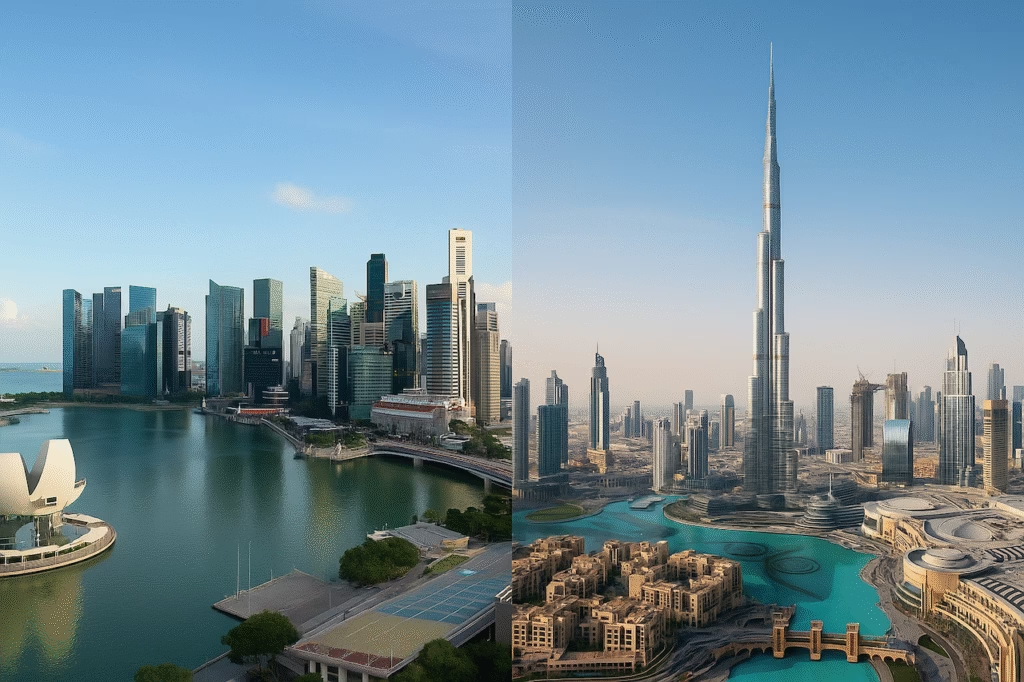Singapore and Dubai are often compared as global hubs of opportunity, with both offering modern infrastructure, business-friendly policies, and regional influence. But for those of us in the Corporate Real Estate (CRE) world, the comparison is mostly centred around opportunity.
Where are the markets growing? What’s driving demand? And most importantly, for professionals building a career in leasing, workplace strategy, project delivery or investment, where will your skills take you further?
Both cities are major commercial hubs. Both have shaped their real estate markets around international business needs. But their differences reveal two very distinct paths for career development.
Two Regional Gateways
At a high level, Singapore serves as a business hub for Asia-Pacific. The economy is anchored by sectors like finance, tech, life sciences and professional services. Multinational corporations, regional firms, and startups alike all contribute to a consistent demand for high-quality workspace.
Dubai, meanwhile, plays a parallel role for the Middle East, Africa, and South Asia. The economy is broad, trade, logistics, tourism, energy, and increasingly, finance and tech. Government-driven initiatives have positioned it as a launchpad for new ventures and innovation clusters.
In both markets, CRE is shaped by business confidence. But the types of occupiers, pace of development, and regulatory context are quite different.
Career takeaway:
Singapore offers depth and continuity, especially in well-established sectors. Dubai offers scale and momentum, particularly in emerging industries and regional trade.
Maturity vs Flexibility
Singapore’s office market is mature and tightly managed. With limited land and strong planning control, supply is contained and quality remains high, not only in the CBD and Marina Bay districts but increasingly too in outlying business parks. It’s an institutional market with high transparency and stable returns.
Dubai has developed rapidly, with expansive land availability supporting large-scale commercial projects. While this has led to more variability in office quality, prime locations like DIFC offer excellent standards. Occupiers have a wider range of options and pricing, which brings opportunity for flexible space models and creative solutions.
Career takeaway:
In Singapore, Real Estate professionals operate in a refined and detail-oriented environment. In Dubai, there’s greater variety, and often more scope to influence outcomes.
Strategy & Design
Singapore is recognised for its progressive approach to workplace design. Global trends, hybrid work, wellness and sustainability are deeply embedded here. There’s a mature ecosystem of consultants, designers and strategists advising organisations on how space can better support people and performance.
Dubai is evolving quickly in this space. There’s strong demand for human-centred workplaces and a clear appetite for new thinking, whether that’s tech integration, space efficiency, or cultural adaptability. Clients are increasingly open to investing in experience-led spaces, both in corporate and public sector environments.
Career takeaway:
Singapore offers structured roles with sophisticated briefs. Dubai rewards those who can educate, inspire and help shape the future of workplace thinking.
Talent Landscape & Professional Growth
Both cities are highly international in nature, but it’s important to recognise the strength of local talent in shaping their respective CRE industries.
In Singapore, there’s a well-established professional community with deep experience across leasing, project delivery, sustainability and investment. The regulatory environment supports clear standards and long-term career development. Many professionals build their careers here over decades, evolving through both local and regional roles.
In Dubai, the workforce is more diverse in terms of background, experience, and career trajectory. The market can feel faster-paced and more fluid, with professionals often taking on broader responsibilities earlier in their careers. It’s a place where entrepreneurial thinking and adaptability are highly valued.
Career takeaway:
Singapore suits professionals looking to deepen their expertise in a structured environment. Dubai is ideal for those seeking variety, responsibility, and a growth-driven environment.
Institutional vs Emerging
Singapore is one of the most mature CRE investment markets globally. It’s home to numerous listed REITs and attracts institutional capital from all over the world. ESG metrics are now fundamental to development and asset management decisions.
Dubai is earlier in its investment journey. The market has traditionally been developer-led, but interest from private equity, family offices and regional funds is rising. Regulatory improvements and transparency initiatives are building investor confidence.
Career takeaway:
Investment roles in Singapore are well-established and technically advanced. In Dubai, there’s an opportunity to help shape investment strategy and platforms as they evolve.
So Where’s the Opportunity?
Naturally there’s no single answer. Opportunity exists in both markets, but how and where it shows up depends on your skills, goals, and stage of career.
Choose Singapore if:
You’re looking for a structured, global-standard environment to build expertise. You want to work with leading clients, in markets where depth and precision are key. It’s also ideal if your ambition includes regional exposure across Asia.
Choose Dubai if:
You’re looking for faster progression, broader scope, or the chance to contribute to market development. You enjoy variety, and thrive in environments where the rules are still being written.
Whether you’re a local professional considering your next move, or someone exploring regional opportunities, it’s worth reflecting on what kind of environment will stretch and support you most.
![The [RE]Search Co.](https://re-search.co/wp-content/uploads/2025/02/The-RE-Search-Co-Orange_Grey-png-350x51.avif)












